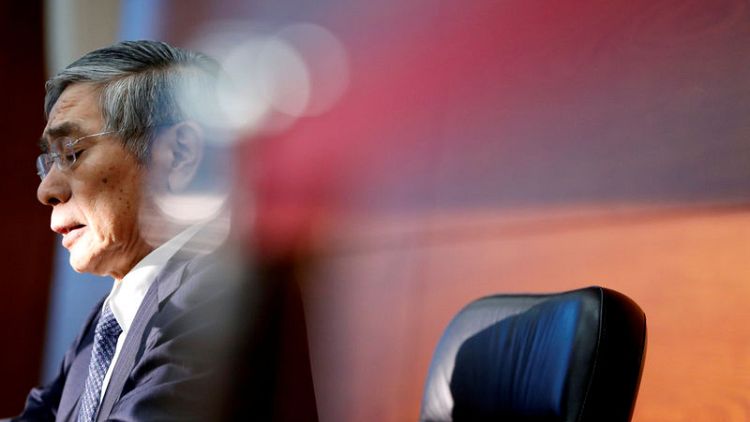By Leika Kihara
TOKYO (Reuters) - Bank of Japan Governor Haruhiko Kuroda said major central banks may have to become more flexible targeting inflation, as they are missing targets due to the price dampening effects of technological innovations and globalisation.
The missed targets and subdued inflation have raised concern over the credibility of central banks' inflation targets, Kuroda said.
The Bank of Japan has maintained an ultra-easy monetary policy in recent years, printing money to jolt the economy out of a long deflationary phase. But it is still struggling to boost inflation to its elusive 2% target.
Japan's experience shows it is hard to re-anchor inflation expectations once they slide below desirable levels, Kuroda said.
"If missing inflation comes from structural factors such as globalisation and digitalization, central banks should continue examining how best to manage inflation expectations .. within the flexible inflation targeting framework," Kuroda told an academic conference hosted by the BOJ on Wednesday.
Former European Central Bank President Jean-Claude Trichet also warned against persisting with rigid price targets, saying it was wrong to think central banks can guide inflation exactly to the levels they target within a set period of time.
"The BOJ is not the only game in town. Structural reforms of the economy remain of the essence," Trichet told the same conference after Kuroda's speech.
An ageing population and stubbornly low wage growth were also hampering achievement of the BOJ's price goal, he added.
Asked if Japan should ramp up fiscal stimulus to fire up inflation, Trichet said doing so would be an "enormous mistake" given the country's massive public debt.
"Interest rates are low now, but will not be eternally low," Trichet said. "There are other ways to achieve higher levels of inflation," he added, brushing aside the view that big fiscal spending backed by central bank debt monetisation was the only choice left for Japan to drive up inflation.
When he became BOJ governor in 2013, Kuroda deployed a huge asset-buying programme with a pledge to achieve 2% inflation in roughly two years.
But inflation remains subdued, forcing the BOJ to ditch the timeframe for hitting its goal and concede that prices will fall short of its target at least until early 2022.
With inflation and wage growth remaining subdued in many countries, Kuroda said central banks must explore ways to use unconventional policy tools to fight the next economic downturn.
"While policy makers have developed a wide range of unconventional policy tools, their effectiveness and transmission mechanisms may differ depending on financial conditions and economic structure," he said.
(Reporting by Leika Kihara; Editing by Chang-Ran Kim & Simon Cameron-Moore)



